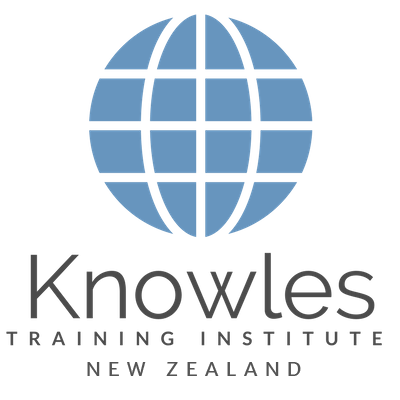Critical Thinking Skills Training Course in New Zealand
Our corporate training course is also available in Auckland, Wellington, Christchurch, Hamilton, Tauranga, Napier-Hastings, Dunedin, Palmerston North, Nelson, Rotorua, New Plymouth, Whangarei, Invercargill, Wanganui, Gisborne, Lower Hutt, Upper Hutt, Porirua, Waitakere, Manukau, North Shore, Hastings, Levin, Timaru, Papakura, Pukekohe East, Taupo, Masterton, Levin, Tokoroa, Queenstown, Wanaka, Kaikoura, Paihia (Bay of Islands), Franz Josef, Milford Sound, Akaroa, Arrowtown, Coromandel Town.
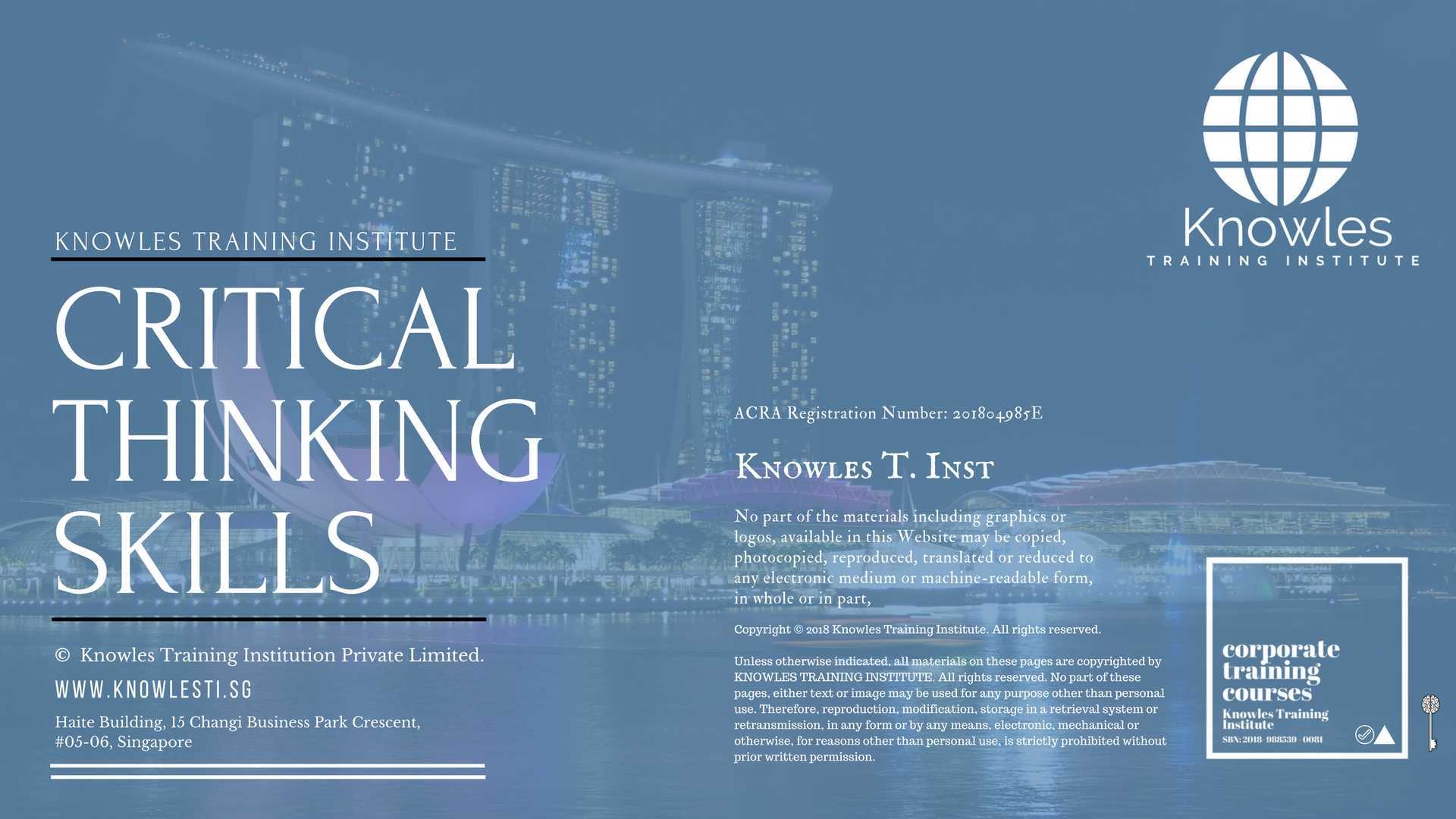
About This Critical Thinking Skills Training Course in New Zealand
Critical Thinking Skills Course in New Zealand
Critical Thinking is a skill most sought-after in an employee. It is more than just being able to think rationally and logically; it also means being able to analyze facts and data to reach a reasonable judgment or opinion. By mastering this skill, employees can make sound decisions and act quickly in problem-solving situations.
We live in a knowledge-based society. Given our exposure to an overwhelming amount of information, Critical Thinking is crucial to digest this information. Critical Thinking gives skills to analyze and evaluate information to absorb the highest amount of knowledge from it. It provides the best chance of making the correct decision and minimizes damages if a mistake does occur.
Critical Thinking will lead to being a rational and disciplined thinker and reduces one’s prejudice and bias. This workshop will provide skills to evaluate, identify, and distinguish between relevant and irrelevant information. It will lead to a more productive career and is an excellent skill for everyday life.
Who Should Attend For This Critical Thinking Skills Training Course in New Zealand Workshop
This critical thinking skills Training Course in New Zealand workshop is ideal for anyone who would like to gain a strong grasp and improve their critical thinking.
All Staff Within An Organisation
Managers
Team Leaders
Executives
Assistants
Officers
Secretaries
Group Size For This Critical Thinking Skills Training Program in New Zealand
The ideal group size for this critical thinking skills course in New Zealand is:
Minimum: 5 Participants
Maximum: 15 Participants
Course Duration For This Critical Thinking Skills Course in New Zealand
The duration of this critical thinking skills Training Course in New Zealand workshop is 2 full days. Knowles Training Institute New Zealand will also be able to contextualised this workshop according to different durations; 3 full days, 1 day, half day, 90 minutes and 60 minutes.
2 Full Days
9 a.m to 5 p.m
Critical Thinking Skills Training Course in New Zealand Benefits
Below Is The List Of Course Benefits Of Our Critical Thinking Skills Course in New Zealand
- Learners develop different approaches to a problem and a critical assessment of alternative solutions.
- Develop a comprehensive view of culture and appreciate differences in opinions.
- Critical thinking skills course fosters a creative solution to a problem.
- Development of decision-making skills
- Constructing rational conclusions.
- Increase efficiency and productivity.
- Promote professionalism and fair judgement.
- Develop systematic thinking.
- Minimize making wrong conclusions.
- Boost self-awareness.
- Improve teamwork and perception of different points of view.
- Decrease squabbles over trivial issues.
- Enhance comprehension and learning.
- Improvement of interpersonal relationship.
- Encourage autonomy and self-directed behaviour.
- Promote teamwork and cause positive impacts on a culturally diverse environment.
- Enhancing presentation and communication skills.
Critical Thinking Skills Course in New Zealand Objectives
Below Is The List Of Course Objectives Of Our Critical Thinking Skills Course in New Zealand
- Understand the components of critical thinking
- Out-of-the-box thinking
- Rational thinking
- Understand what it means to be a critical thinker
- Assess information using critical thinking skills
- Know the benefits of critical thinking
- Revise perspective and viewpoints, when necessary
- Understand problem-solving abilities
Course Content For This Critical Thinking Skills Training Course in New Zealand
Below Is The List Of The Course Content Of Our Critical Thinking Skills Training Course in New Zealand
Critical Thinking Course in New Zealand – Part 1
Critical thinking is akin to the study of logic. Critical thinking relates to how we make decisions and use our judgment. Critical thinking is more than just thinking about thinking or metacognition. It is also about how we take action. Critical thinking involves many components, and we will address several unique components in this part of the course.
- Applying Reason
- The ability to reason is often regarded as one of the characteristic marks of being human. An individual’s ability to reason well is a critical thinking skill. Numerous definitions of critical thinking tend to focus on the ability to reason.
- Open-Mindedness
- Open-mindedness is the virtue by which we study — in particular, staying open-minded means taking into account relevant data or arguments to revise a comprehensive understanding. It means being critically open to options, willing to consider other possibilities even after having reached an opinion, and not letting preconceived notions to stifle or inhibit reflection on newly presented information.
- Analysis
- In critical thinking, the step of analysis assists us to distinguish and access information. Learning transpires in three domains: cognitive, effective, and psychomotor. In the cognitive area, analysis involves the process of discriminating or separating.
Critical Thinking Course in New Zealand – Part 2
As we will cover in the previous part of this course, we can approach critical thinking and problems in a step-by-step fashion. It is called linear or vertical thinking. However, often, we tend not to line up the premises in a normal step-by-step fashion. When we approach a problem in a different order, we are using non-linear thinking. Sometimes, non-linear thinking is also called lateral thinking.
- Logic
- Logic and conclusion are similar, but not identical. Logic is the branch of philosophy that gives the rules for acquiring valid conclusions. A conclusion is legitimate if it follows from statements that are accepted as facts. For instance, a logical statement might be, 1 + 1 = 2.
- Step Out of Your Comfort Zone
- One of the first steps in developing non-linear thinking is to step out of your comfort zone. This concept involves comprehending information or circumstances from a different perspective. A zone is defined as an area set apart in some way.
- Do not Jump to Conclusions
- An essential step in problem-solving is taking the time to acquire the necessary information. Often, we tend to jump to conclusions before we have all of the facts. How can we use our understanding of logic to gather all the necessary data?
Critical Thinking Course in New Zealand – Part 3
Logical thinking is a process which involves steps. In general logical thinking involves checking the components of the argument and making connections between them, which is what we call reasoning. The four significant steps of logical thinking are 1) asking the right questions, 2) organising data, 3) evaluating the information, and 4) concluding. In this module, we will analyse these necessary steps.
- Expect and Initiate Change
- “Be the change you wish to see,”is a common slogan on bumper stickers. With so many events happening on an international and national level each day, change is simply a standard sequence in businesses. We can always expect changes in organisations.
- Being Ready to Adapt
- The question in today’s culture is not will change occur in an organisation, but how well are employees at adjusting to change. Employees protect themselves from becoming obsolete by changing. Adaptation is a survival skill of nature
- Ask the Right Questions
- The first step in logical thinking should commence by asking the right questions. Based on the components of critical thinking, logical thinker should start reasoning by asking many questions. A vital question to ask is “What are the premises?”
Critical Thinking Course in New Zealand – Part 4
- Organise the Data
- Organising data is the second step in the Logic process. Once we know the premises, we can begin to arrange the data. We can organise the information by making connections.
- Evaluate the Information
- After organising the information, the logical thinker can proceed with evaluating it. Evaluating information involves determining whether the information is valid. Conclusions cannot be made until a distinction is made between truth and validity.
- Draw Conclusions
- Once the data has been collected, organised, and evaluated, we can then conclude. Recall that in deductive reasoning, conclusions are gathered based on valid premises. In inductive reasoning, we use observations to draw conclusions or a hypothesis.
Critical Thinking Course in New Zealand – Part 5
- Active Listening
- We have all heard it before the best communicators are active listeners. What does it mean to practice active listening? Active listening suggests the listener is completely engaged in what the speaker is communicating and judging what is being said.
- Be Curious
- Curiosity is yet another skill in improving critical thinking. Some scholars maintain that Socrates ultimate goal was not so much to advocate his methods, but to advocate self-improvement and to spark curiosity. The primary purpose of a teacher is to spark interest and engage their students.
- Be Disciplined
- Reasoning and rationale are often correlated with self-discipline. Critical thinking is a self-disciplined and self-guided action. Critical thinking compels the individual to use their reasoning skills and have the ability to evaluate and reflect.
Critical Thinking Course in New Zealand – Part 6
- Be Humble
- Humility is defined as the“essence of being modest of opinion or estimate of one’s importance.” Humility is the contrast of arrogance. Humility relates to having an open mind.
- Seeing the Big Picture
- One of the principal functions of thinking is to create connections. Our ideas gain significance when we can relate or connect them to other concepts. We start to attain insight when we see the similarities between ideas.
- Objectivity
- Objectivity is defined as “intentness on objects external to the mind.”In critical thinking, we strive to have an acute understanding of objectivity. Objectivity is a heuristic or rule/approach for problem-solving.
Critical Thinking Course in New Zealand – Part 7
- Using Your Emotions
- As suggested in the previous section, emotions should not be disregarded altogether when thinking critically. Emotions play a significant role in the thinking process. For example, professionals need empathy when working with others regardless of their occupation to vicariously experience what others feel, believe, or wish.
- Being Self-Aware
- Self-awareness is a characteristic of a Critical Thinker. This is to acutely be aware of one’s feelings, opinions, and assumptions. Moreover, it is an origin point for thinking critically.
- Making Assumptions
- As we mentioned in the previous module, self-awareness is a starting point from which we commence to think critically. We based our choices on assumptions we get about objects or things. Assumptions are the arguments, but the distinctive feature of a hypothesis is that it is a declaration in which no proof or evidence is provided.
Critical Thinking Course in New Zealand – Part 8
- Watch out for the Bias
- As we learned in the section on logic, confirmation bias can impact the inferences we draw. Bias is not something that we can eliminate. However, when thinking critically, we need to watch out for confirmation bias.
- Ask Clarifying Questions
- As we discussed in an earlier section, asking the right questions is essential. Equally important is to ask clarifying inquiries when making decisions. Clarifying questions are thought-provoking questions to obtain more information.
- SWOT Analysis
- SWOT Analysis is also called Strengths, Weaknesses, Opportunities, and Threats. We use this type of analysis to be more objective thinkers. SWOT allows us to think clearly and clearly, and from a rational point of view.
Critical Thinking Course in New Zealand – Part 9
- Being More Persuasive
- Persuasiveness is the characteristic of being capable of influencing others. We usually think of salespersons and politicians when we hear the word persuasiveness. However, all managers or professionals use persuasiveness daily.
- Better Communication
- Critical thinking improves communication for some of the same reasons that it improves persuasiveness. Many of the same factors we use to improve our persuasiveness also make us better communicators in general. For example, the use of analogies and metaphors are a great persuasion and general communication technique.
- Better Problem Solving
- Critical thinking and problem-solving are closely related and are almost intertwined. Sometimes we say that to solve logic problems; we must use our critical thinking skills. Logic, critical thinking, and problem-solving use some of the same cognitive processes.
Critical Thinking Course in New Zealand – Part 10
- Increased Emotional Intelligence
- What is emotional intelligence and how does critical thinking aid increase our emotional intelligence? Emotional intelligence is identified as the capacity to assess and control the emotions of oneself, others, and even groups. Emotional intelligence is being “heart smart” as opposed to “book smart.”
- Limitations of Your Point of View
- As discussed at the beginning of this course, one element of critical thinking is open-mindedness. This component, as well as bias, relate to the critical thinkers’ point of view. The less open-minded and more biased a person is, the more limited their point of view.
- Considering Others Viewpoint
- One reason we find it so tough to consider other’s viewpoint is that we are over-concerned with our own opinions and views. A challenge for the critical thinker is to step down from the “mountain of self”, and climb up the “mountain of the other”. Considering another viewpoint is more comfortable when we know the benefits.
Critical Thinking Course in New Zealand – Part 11
- Influences on Bias
- In this course, we have discussed bias and how it influences our conclusions in the logic process. What are some influences on the bias? The first thing that can influence bias is the way the person interprets the information he or she is receiving.
- When New Information Arrives
- When the critical thinker receives new information, how should they organise it? Probably the most common way of handling new information is through an organisation schema. Schemas indicate which further role information plays.
- Identify Inconsistencies
- Much of critical thinking is about how to connect the two points in a problem. However, sometimes, critical thinkers are presented with inconsistencies or what scientists call cognitive dissonance. Cognitive dissonance can emerge through a discrepancy between attitude and beliefs. Inconsistencies can also be called variances or dissimilarities.
Critical Thinking Course in New Zealand – Part 12
- Trust Your Instincts
- “Trust your instincts”comes under the second stage of problem-solving, and you should now start to see solution paths. Instincts are defined as a natural intuitive power. Intuition or instincts are vital pieces in problem-solving.
- Asking Why?
- In an earlier module, we discussed how asking the correct question is essential in logical thinking. Asking why is equally important in problem-solving. It is not sufficient to be bestowed with the information or data.
- Evaluate the Solution(s)
- Once a possible solution has been acquired, problem solvers may believe they can proceed with the answer. However, they should not overlook the all-important step of evaluating all possible solutions. Sometimes, one problem has more than one solution and taking the time to assess the efficacy of each alternative is a critical thinking skill.
Critical Thinking Course in New Zealand – Part 13
- Retaining Your New Skills
- Now that we have learned many new critical thinking skills, our next challenge is to retain these skills. There are many methods to help you retain your new critical thinking skills. Developing a schema for organising and remembering information is one method.
- Reflect and Learn From Mistakes
- Reflection is a useful step in the logic process. Reflecting and learning from mistakes is also helpful in critical thinking. You may not be able to reflect every time you engage your critical thinking skills.
- Always Ask Questions
- The importance of inquisitiveness cannot be overemphasised in the process of critical thinking. One contribution to civilisation that Socrates made was that he advocated the questioning process during a debate. Furthermore, learning is a process sparked by the wish to know more.
- Practising Critical Thinking
- The best way to enhance your critical thinking skills is to practice. Develop ways to remember and organise the techniques from this course. Develop a schema.
Critical Thinking Skills Course in New Zealand Value Added Materials
Each participant will receive the following materials for the Critical Thinking Skills course in New Zealand
Critical Thinking Skills Course in New Zealand Learner’s Guide
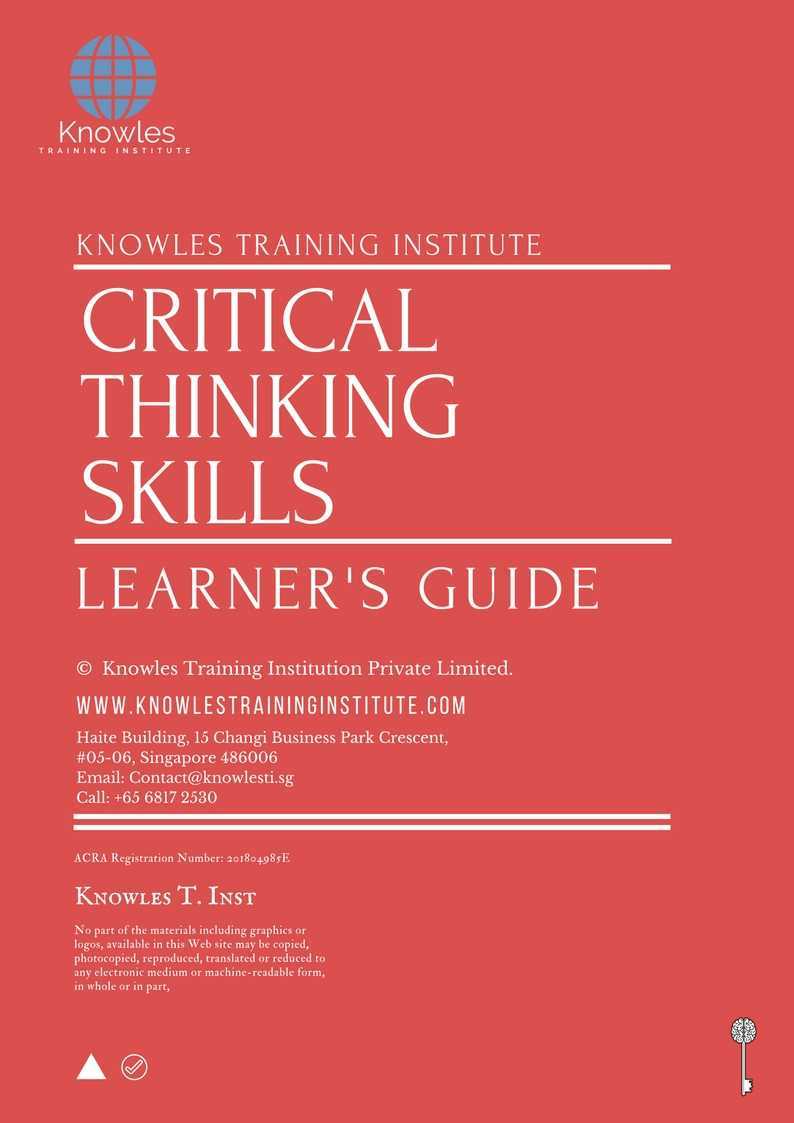
Critical Thinking Skills Course in New Zealand Handouts
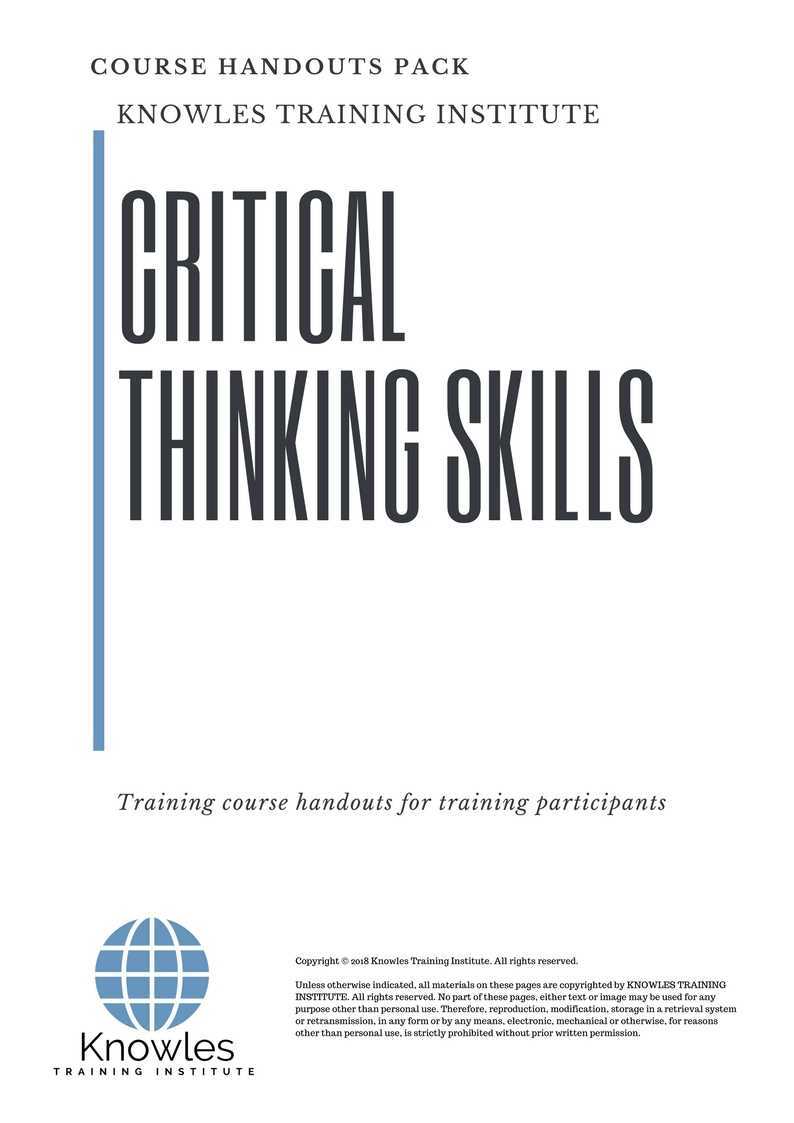
Critical Thinking Skills Course in New Zealand PPT Slides Used During Course
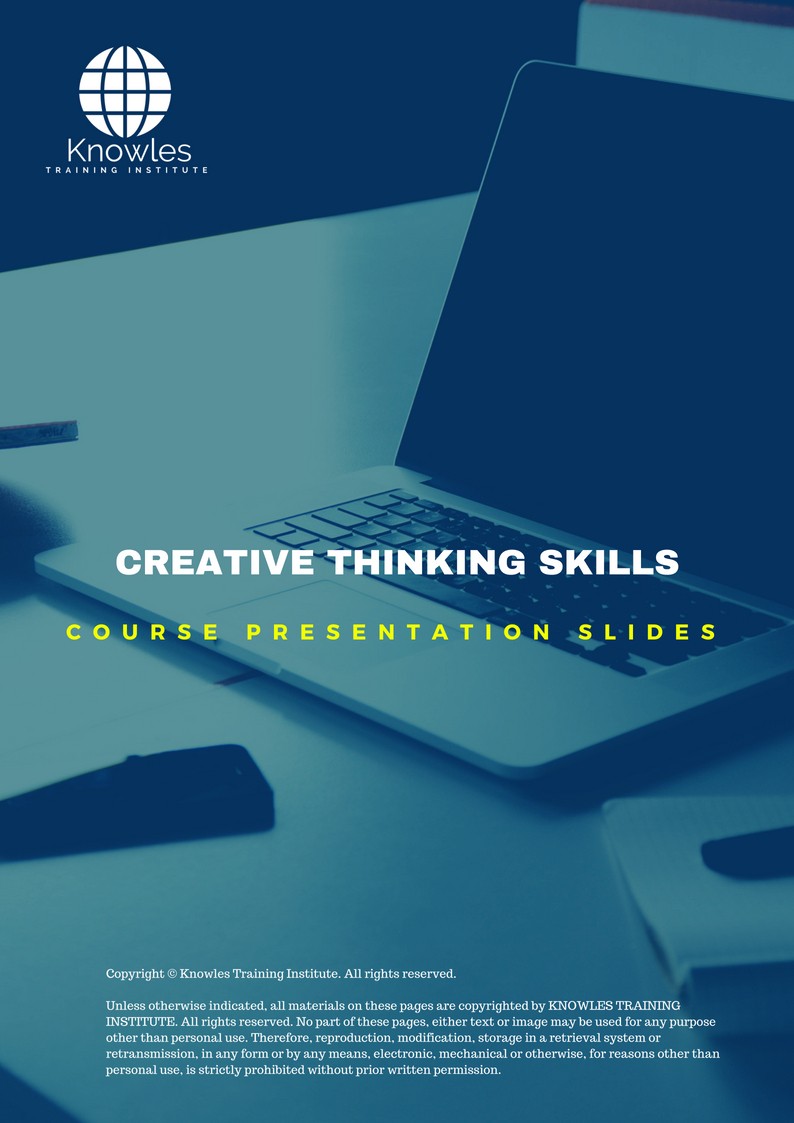
Critical Thinking Skills Training Course in New Zealand Certification
Each course participant will receive a certification of training completion
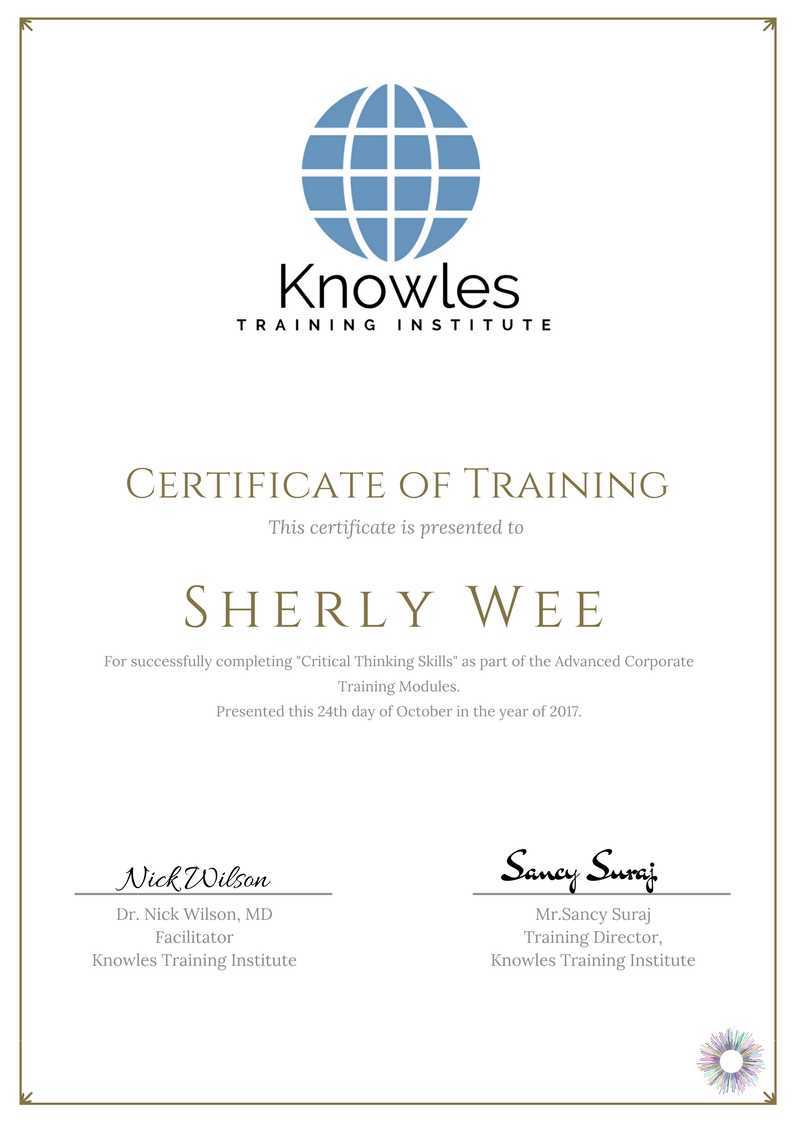
Course Fees For Critical Thinking Course in New Zealand
There are 4 pricing options available for this Critical Thinking Skills training course in New Zealand. Course participants not in New Zealand may choose to sign up for our online Critical Thinking Skills training course in New Zealand.
- USD 679.97 For a 60-minute Lunch Talk Session.
- USD 289.97 For a Half Day Course Per Participant.
- USD 439.97 For a 1 Day Course Per Participant.
- USD 589.97 For a 2 Day Course Per Participant.
Discounts available for more than 2 participants.
Upcoming Critical Thinking Skills Training Course in New Zealand Schedule
Contact us for the latest Critical Thinking Skills course in New Zealand schedules:
Email: contact@knowlesti.nz
Message:
Download Critical Thinking Skills Course in New Zealand Brochure
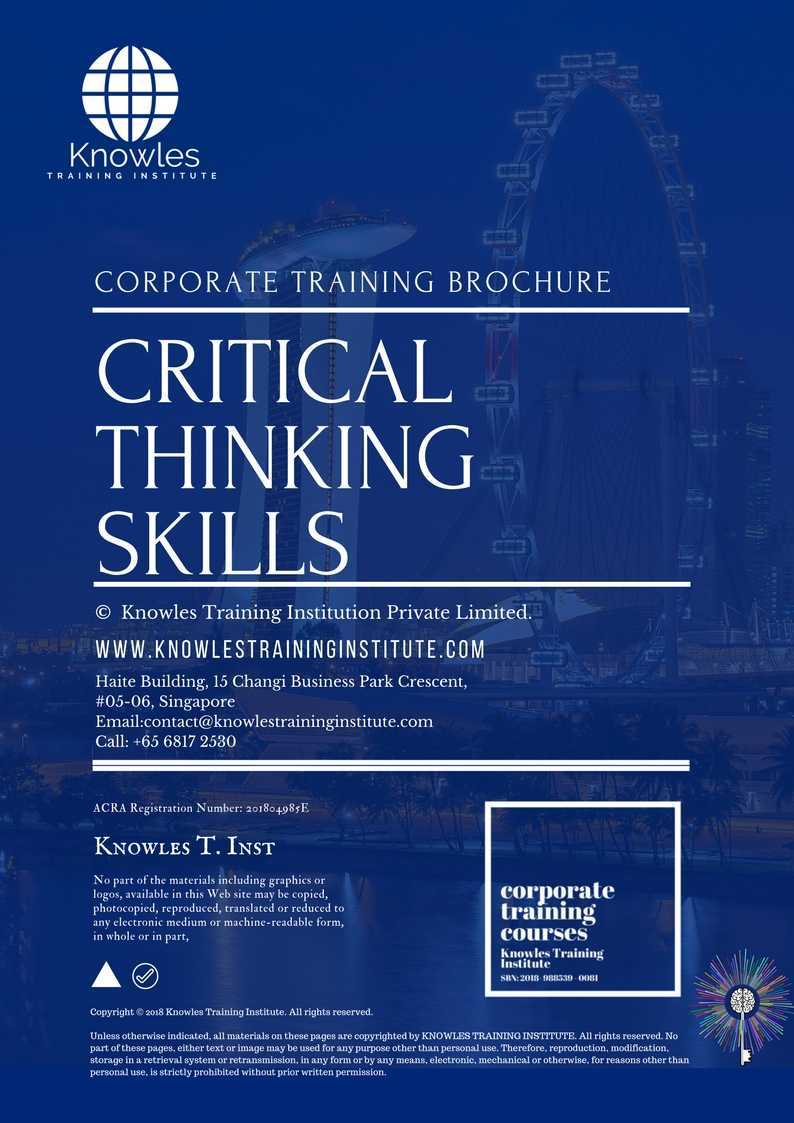
Request for this Critical Thinking Skills course in New Zealand brochure. Fill up the short information below and we will send it to you right away!
Post Training Support: A vast majority of training does not have any effect beyond 120 days. To work, training has to have a strong pre- and post-training component. Post-training reinforcement helps individuals to recall the understanding and ask questions.
Blended Learning: Learning does not occur in the classroom. Virtually everybody prefers distinct ways of learning. Successful learning should have a multi-channel, multi-modal strategy.
- We Understand The Industry: We’ve got a profound comprehension of the business, business design, challenges, strategy and the that our participants are in and have designed the courseware to cater to their professional needs.
- Course Content: Knowles Training Institute’s material is relevant, of high quality and provide specific learning results. Participants will leave the training course feeling as they have gained a strong understanding and will also be in a position to execute what they have learned sensibly.
Course Development — The workshop modules follow a systematic and logical arrangement. This structure helps to ensure that the course material allows the facilitators to deliver the course in a logical arrangement. Consider the subjects as building bricks into learning, our facilitators slowly build towards a comprehensive picture of this entire topic.
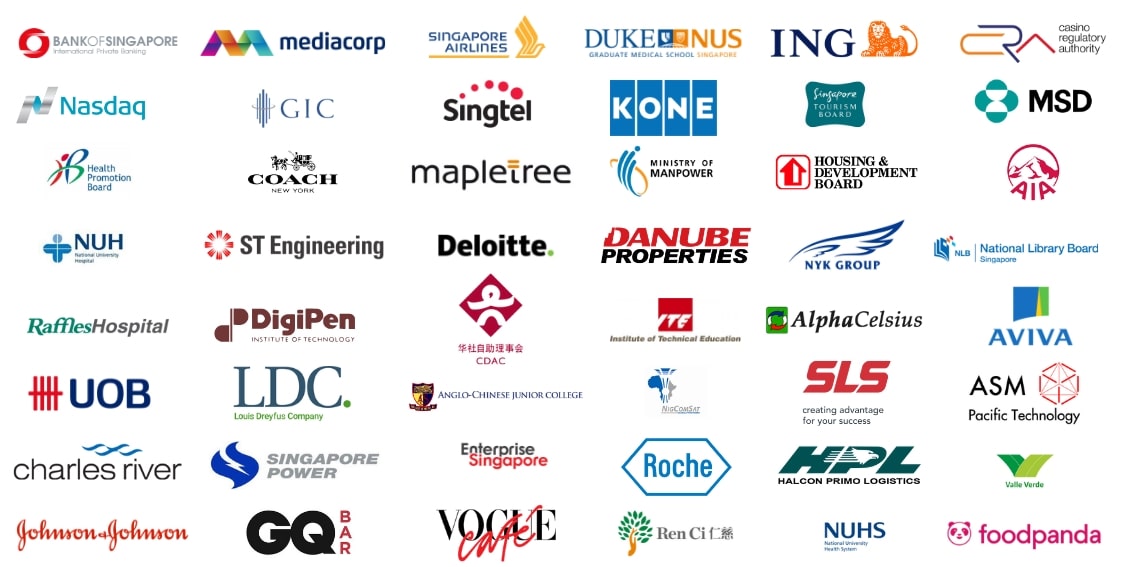

Course Enquiries

Fill up the form and we will get back to you in less than 1 working day.
Alternatively, give us a call to have one of our training consultants contact you. Our corporate training courses can be contextualized to meet your organization’s training needs. Leverage on our large pool of professional trainers and consultants for your organization’s training needs.
Email: contact@knowlesti.nz
We Guarantee 100% Privacy. We Respect Your Privacy. Your Information Will Never Be Shared.
